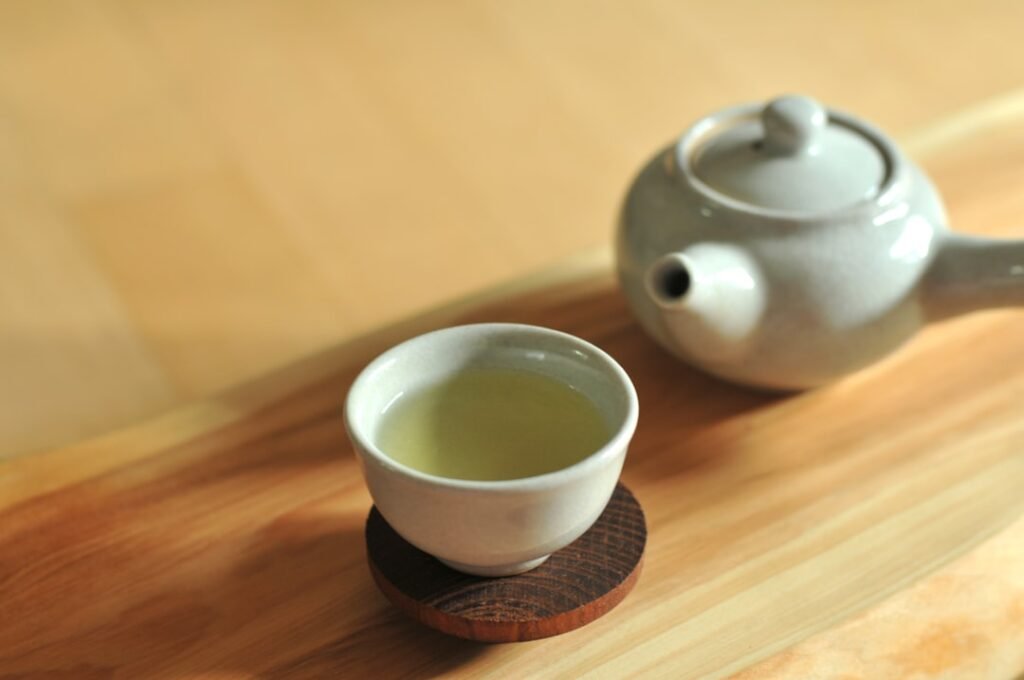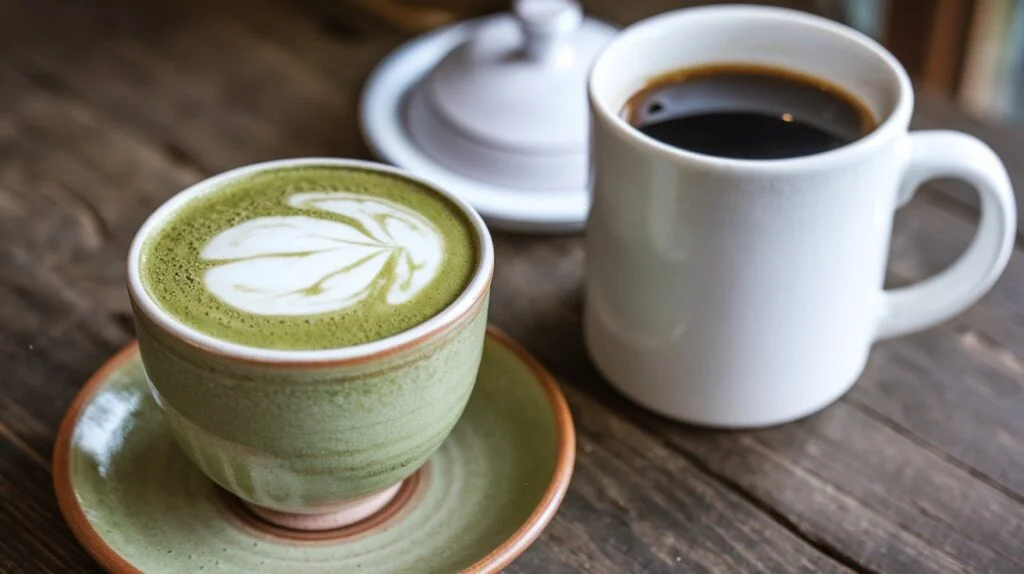
Artisanal Rituals for a Memorable Customer Experience
How can brands create a more balanced and memorable customer experience by blending artisanal product quality with thoughtful everyday rituals that keep people coming back?

How much caffeine in green tea? If you’re curious, an 8-ounce cup usually contains 20 to 50 mg of caffeine. That’s less than both black tea and coffee, making green tea a moderate choice for a caffeine boost.
Green tea, with its rich history and vast array of health benefits, has intrigued tea drinkers for centuries. Originating from unoxidized leaves of the Camellia sinensis plant, it’s one of the least processed teas. This characteristic preserves its rich supply of antioxidants and polyphenols, compounds that have been linked to improved heart health, weight management, and even potential cancer prevention.
But while green tea is renowned for its health advantages, the caffeine it carries can be a concern for some. Whether you aim to cut back on caffeine or are simply curious about its content, understanding what’s in your cup is essential.

When sipping on green tea, you might wonder exactly how much caffeine you’re getting. Typically, an 8-ounce cup of green tea contains 30 to 50 mg of caffeine. This range can vary due to several factors, including the type of green tea, how it’s processed, and how it’s brewed.
Brewing Factors:

Comparing green tea to coffee, the caffeine difference is quite noticeable. A standard 8-ounce cup of brewed coffee usually contains around 95 mg of caffeine, which is significantly higher than green tea. This makes green tea a gentler choice for those looking to manage their caffeine intake.
Health Impact:
For those who are sensitive to caffeine, green tea offers a moderate option that can be enjoyed at various times of the day without overwhelming your system. It’s a great way to stay alert and refreshed, while still reaping the health benefits associated with this popular beverage.
Green tea is a powerhouse of antioxidants and polyphenols, especially catechins like EGCG (epigallocatechin gallate). These compounds play a crucial role in protecting our cells from damage caused by free radicals. Antioxidants are essential in reducing oxidative stress, which can lead to chronic diseases, including cancer.

Research has shown that regular consumption of green tea may help lower the risk of certain types of cancer. For instance, a study involving over 69,000 Chinese women found that those who drank green tea at least three times a week had a 14% lower risk of developing cancers of the digestive system, including colon, stomach, and esophageal cancers.
When it comes to weight management, green tea is often praised for its potential to aid in weight loss. The catechins in green tea can boost metabolism and increase the body’s ability to burn fat. Although the impact on weight loss might be modest, incorporating green tea into a balanced diet and exercise routine can support overall health goals.

While some studies suggest that green tea extracts with high catechin concentrations can improve metabolism, drinking green tea alone is unlikely to result in significant weight loss. However, its role in a healthy lifestyle should not be underestimated, as it contributes to better cardiovascular health and overall well-being.
Green tea also supports cardiovascular health. The antioxidants and polyphenols can help reduce inflammation and improve blood flow, which may lower the risk of heart disease. Regular green tea consumption has been associated with reduced blood pressure and cholesterol levels, contributing to a healthier heart.
In summary, while green tea is not a miracle cure, its antioxidant properties, potential to aid in weight management, and benefits for cardiovascular health make it a valuable addition to a healthy lifestyle.
While green tea is celebrated for its many benefits, be aware of potential side effects, especially regarding caffeine sensitivity and liver health.
For some individuals, green tea’s caffeine can cause issues. Caffeine sensitivity varies from person to person. Symptoms might include insomnia, anxiety, or feelings of restlessness. These effects are more likely if green tea is consumed in large amounts or later in the day.

To minimize these side effects, consider opting for decaffeinated green tea or adjusting your brewing method. Using cooler water and a shorter steeping time can help reduce caffeine content.
High doses of green tea extracts can sometimes be a concern for liver health. Though uncommon, these extracts have been linked to liver issues in certain cases. These reactions are unpredictable and don’t happen to everyone. Researchers are still trying to understand why they occur.

If you’re considering green tea supplements, it’s crucial to consult with a healthcare professional. The FDA does not regulate these supplements, so they may contain substances that could pose health risks.
Green tea can also affect iron absorption. The polyphenols in green tea may bind with iron, reducing its absorption in the body. If you have iron deficiency or are at risk, consider consuming green tea between meals rather than with meals to minimize this effect.
In summary, while green tea offers numerous health benefits, it’s important to be mindful of these potential side effects. Adjusting consumption habits can help mitigate risks and allow you to enjoy green tea safely.
Green tea does contain caffeine, but not as much as coffee. An 8-ounce cup of green tea typically has about 30-50 mg of caffeine. In contrast, the same amount of coffee can contain 80-100 mg of caffeine. This makes green tea a moderate option for those looking to manage their caffeine intake.
For most people, consuming up to 400 mg of caffeine per day is considered safe. This means you could enjoy around 8-10 cups of green tea daily without surpassing this limit. However, individual tolerance to caffeine can vary, so it’s important to listen to your body and adjust your intake accordingly.
The best time to enjoy green tea can depend on personal preferences and how caffeine affects you. Since green tea contains caffeine, many people prefer to drink it in the morning or early afternoon. This timing can provide a gentle energy boost without interfering with sleep.
Some people find that drinking green tea on an empty stomach helps with alertness, while others prefer it with meals. If you’re sensitive to caffeine, it’s wise to avoid green tea in the late afternoon or evening to prevent sleep disturbances.
Green tea is often linked to weight loss benefits, thanks to its potential to boost metabolism. The caffeine and antioxidants in green tea, particularly catechins, may aid in calorie burning and fat oxidation. This can make green tea a helpful addition to a balanced diet and exercise routine.
However, it’s important to note that while green tea can support weight management, it is not a magic solution. Sustainable weight loss requires a holistic approach, including healthy eating and regular physical activity. Green tea can be a part of this lifestyle, providing a refreshing way to stay hydrated while potentially supporting your weight goals.
At Equipoise Coffee, we understand the need for a balanced daily beverage. Green tea offers a moderate caffeine boost along with health benefits. Its caffeine content provides gentle energy, while coffee can offer a stronger lift with additional benefits.
Coffee is rich in antioxidants and can lower the risk of certain diseases, like type 2 diabetes and Parkinson’s. Both drinks have their perks, letting you choose how you want to start your day.

For a balanced brew, both green tea and coffee offer unique benefits. Green tea provides a gentle caffeine boost along with powerful antioxidants that support overall health. It’s a versatile choice for those who want to manage their caffeine intake while enjoying additional wellness perks.
Meanwhile, coffee delivers a stronger caffeine kick that can improve energy and mental alertness. Both beverages align with our dedication to quality and wellness, making them excellent choices for a healthy lifestyle.
Find more about our selection of ethically sourced and precisely roasted coffees at Equipoise Coffee. Accept the balanced brew that suits your lifestyle and taste preferences.

How can brands create a more balanced and memorable customer experience by blending artisanal product quality with thoughtful everyday rituals that keep people coming back?

Independent coffee shops have always been about more than caffeine—they’re hubs of creativity, connection, and care. As café culture continues to evolve, new trends are

Introduction Independent cafes win when they feel like the neighborhood’s living room and operate with the discipline of a great kitchen. Below is a quick

Discover how top specialty coffee brands create lasting loyalty through storytelling, sourcing, and community connection. Real tips from 6 industry experts.

Discover the ultimate showdown between two beloved coffee brewing methods: the French press and Chemex. Explore how each technique caters to distinct palates, with the French press delivering bold flavors and the Chemex presenting a bright, clean taste.

Unlock the secrets to brewing the perfect cup of coffee with our comprehensive guide on using a coffee scale. Discover how precise measurements enhance flavor and consistency while eliminating bitterness.

Discover how water temperature plays a vital role in brewing the perfect cup of coffee. This article delves into the ideal temperature range of 195°F to 205°F for optimal flavor extraction, enhancing the enjoyment of high-quality beans.

Discover the world of curated specialty coffee bundles, perfect for enthusiasts seeking quality and craftsmanship. This article explores the benefits of ethically sourced, small-batch beans from brands like Equipoise Coffee, offering diverse flavor profiles that elevate your brewing experience.

Discover the art of manual brewing to elevate your coffee experience! This article explores various techniques like pour-over, French press, and AeroPress, revealing how they enhance flavor and your connection to every cup.